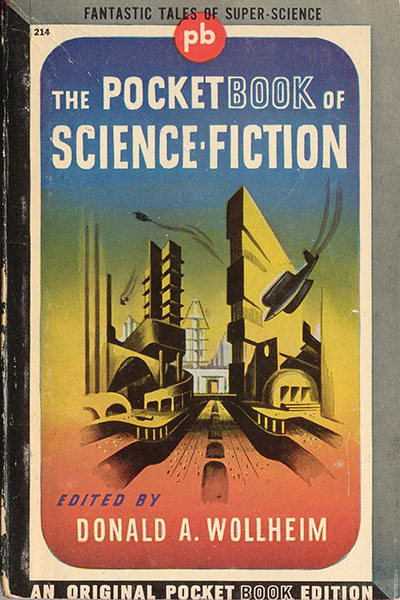By John Hertz: I’m not sure if it’s a classic of science fiction. But it reminds me of the fellow (in 1875?) who said Shakespeare was full of quotations.
By the time I got to Stephen Vincent Benét’s “By the Waters of Babylon” (1937) I’d read a lot of post-apocalypse stories. The title recalls one I think is among the best, Pat Frank’s Alas, Babylon (1959).
“By the Waters” has Dead Places which are forbidden and a religion of caretakers. Its boy narrator coming of age finds on a journey a lost place of great riches. The god who lived there must have been a powerful god.
There was a shattered image of white stone, a man or a god who wore his hair tied back and whose name, on the cracked half of a stone, was ASHING. You can supply W and TON and so could I.
The boy wants to tell everyone but his father, a priest, says “Truth is a hard deer to hunt. If you eat too much truth at once, you may die of the truth.” Perhaps, thinks his son, in the old days people ate knowledge too fast.
Look at the date. Benét’s story came two years before the Einstein-Szilárd letter, a year before the Hahn-Strassman-Meitner-Frisch discovery of nuclear fission; four years before Heinlein’s “Solution Unsatisfactory”, seven before Cartmill’s “Deadline”.
Scholarship says, as I understand, that Benét was probably moved by the bombing of Guernica, 26 Apr 37. Picasso finished his painting in June.
“I like the Carpenter best,” said Alice, “if he didn’t eat so many oysters as the Walrus.” “But he ate as many as he could get,” said Tweedledum.
We’ve anthologized “By the Waters” repeatedly over the years, starting with Wollheim’s pioneering Pocket Book of Science Fiction (1943).
 Benét was a fine and maybe a great poet. During his life he was better known than T.S. Eliot, Robert Frost, Wallace Stevens.
Benét was a fine and maybe a great poet. During his life he was better known than T.S. Eliot, Robert Frost, Wallace Stevens.
Some prose is poetry.
Discover more from File 770
Subscribe to get the latest posts to your email.

It’s really time for a rediscovery of Benét’s work, both this and the rest. He really was a fine poet.
I reread “By the Waters of Babylon” recently, and it’s every bit as powerful as it was when I first read it at age 12. Better in many ways, since I know exactly where the narrator is, and I recognize the names of all the places now.
There’s a reason I picked it for the Young People project.
A fine story, indeed, and one we do well to continue to remember. And he was a fine poet. (But when you adduce Eliot, Frost, and especially Stevens, I’m tempted to go all Lloyd Bentsen on you — “I’ve read Eliot, and Frost, and Stevens, and you, Mr. Benet, are not them.” They were at a different level, truly, as poets.)
@Rich Horton: On the other hand, who reads Eliot or Stevens for pleasure? I don’t, with the exception of a small number of Eliot’s lesser works.
I read Stevens over and over for pleasure — immense pleasure. The early poems (most of HARMONIUM, essentially) are fairly accessible, sonically and imagistically lush, really beautiful.
Later Stevens is doubtless more recondite, harder going, but to me very rewarding.
Tastes differ, but Stevens is my favorite poet, and a constant part of my reading life.
I also read Eliot with pleasure, though less so. And I find the more familiar Frost very enjoyable too (“Two Tramps in Mud Time”, “Mending Wall”, etc.), though I don’t regard myself as terribly familiar with Frost.
Tastes do vary! I recognize that Eliot and Stevens are great poets. I just don’t find them to my taste, in meaning or in music, with a few rare exceptions.
Both of you are misreading Hertz. He says that Benét was better known in his time; that doesn’t speak to the quality or durability of the work. History is littered with artists (in many forms) who were popular in their time but are now less-known or practically forgotten — many of them deservedly. I’ll leave you to argue over whether it’s fair to compare your favorites, who lived into their 70’s or later, with someone who died at 44.
Ah, for what its worth, I don’t think I misread him, only wanted to urge from a sense of partisanship for the likes of Stevens that Benet really was a minor poet next to them.
I’m not sure that age is that much of a determinant, though I suppose it’s true that Stevens in particular did an unusual amount of his major work at a fairly advanced age, and even his early work (of any value) appeared when he was in his mid-30s. (But then there’s Keats!)
It’s not a big deal. I don’t want to distract from the appropriate attention given to “By the Waters of Babylon”, a very good and remarkably prescient story, as John noted. But I am always happy for an excuse to discuss great poetry, and I don’t think there’s anything wrong with that!
John Hertz replies by carrier pigeon:
Frogs Eat Butterflies.
Snakes Eat Frogs.
Hogs Eat Snakes.
Men Eat Hogs.
There was something else about mermaids singing, and lurking frost, but the paper was crinkled and I couldn’t make it out.
Pingback: AMAZING NEWS FROM FANDOM: 10-22-2017 - Amazing Stories
Very nice!
— signed, a lean cat in the arches …